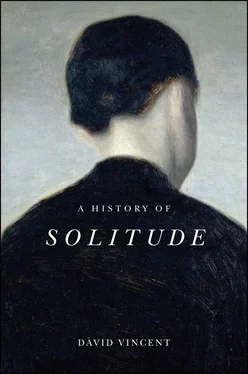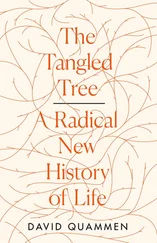Disgusted at the guilt or absurdity of Mankind, the Misanthrope flies from it; He resolves to become an Hermit, and buries himself in the Cavern of some gloomy Rock. While Hate inflames his bosom, possibly He may feel contented with his situation: But when his passions begin to cool; when Time has mellowed his sorrows, and healed those wounds which He bore with him to his solitude, think you that Content becomes his Companion? Ah! no Rosario. No longer sustained by the violence of his passions, He feels all the monotony of his way of living, and his heart becomes the prey of Ennui and weariness. He looks around and finds himself alone in the Universe: The love of society revives in his bosom, and He pants to return to that world which He has abandoned. Nature loses all her charms in his eyes: No one is near him to point out her beauties, or share in his admiration of her excellence and variety. Propped upon the fragment of some Rock He gazes upon the tumbling water-fall with a vacant eye. He views without emotion the glory of the setting Sun. He returns to his Cell at Evening, for no one there is anxious for his arrival; He has no comfort in his solitary unsavoury meal: He throws himself upon his couch of Moss despondent and dissatisfied, and wakes only to pass a day as joyless, as monotonous as the former. 66
There was no sense of the youthful hermit being sustained by an unmediated encounter with God in the silence of his cell. Bereft of society, he is incapable of preventing a collapse of spirit.
The Monk himself enjoys a reputation as a fashionable preacher, but is portrayed as ‘virtuous from vanity, not principle’. 67Having sought to rescue the young hermit from the dangers of solitude, he himself falls into every kind of corruption, including rape and murder. The instant success of the novel both created and destroyed the reputation of its youthful author. 68Criticism of the novel did nothing to harm sales, however, and as with other popular successes in print or on the stage in the Georgian era, it was rapidly translated into diverse cultural forms, including plays and chapbooks, which ensured that its message reached an audience well beyond the novel-reading public. 69The issue of ‘religious fanaticism’ became one of a range of arguments about the merits and demerits of solitude that were given a new focus by the late-eighteenth-century debate but in no sense brought to a conclusion. As we shall see in Chapters 4and 6in particular, the function of solitary spiritual observance remained an area of controversy, innovation and experiment in areas such as penal policy, revived monasticism and evolving forms of private observance.
Zimmermann viewed solitude much as a doctor might consider the human body. If health was the central objective, it was the business of the medical practitioner to engage with the frequent threats to wellbeing and, where necessary, take action to prevent the outbreak of personal illness or wider epidemics. There was always a need for disciplined exercise by the individual to ensure moral and intellectual fitness, particularly for those with highly tuned minds. Forms of personal relaxation needed to be monitored in case they undermined the patient’s constitution. In 1760, Zimmermann’s colleague Tissot had diagnosed a particular category of solitary behaviour in a text which framed the debate on the subject until the twentieth century. Those who committed the vice of onanism, he wrote, ‘are all affected with hypochondriac or hysterical complaints, and are overcome with the accidents that accompany those grievous disorders, melancholy, sighing, tears, palpitations, suffocations, and faintings’. 70The sequence of events was a function of a more general withdrawal from company. Once the individual began to obsess about a particular desire and ceased to participate in the affairs of others, disaster beckoned. ‘Nothing is more pernicious’, Zimmermann insisted, ‘to people inclinable to be devoted to a single idea, than idleness and inactivity; this is particularly pernicious to our patients, and they cannot too assiduously avoid laziness and solitude. Rural exercise and agriculture are more particularly diverting than any others.’ 71
Two aspects in particular of Zimmermann’s approach to his chosen topic were relevant to the history of solitude as the modern world took shape. The first was his conception of solitude as an event. The mere fact of physical isolation was of little interest. It was not whether but why a person was alone. What determined the impact of solitude both on the individual and on society was the state of mind that caused the retirement from company. 72There was all the difference between the withdrawal to the closet or the countryside for the purpose of self-collection, and the retreat to the same spaces because of emotional defeat or misguided passion. As Zimmermann wrote,
If the heart be pure, the disposition cheerful, and the understanding cultivated, temporary sequestrations from general or even private intercourse, will improve the virtues of the mind and conduce to happiness; but when the soul is corrupted, and myriads of depraved images and wishes swarm in the tainted imagination, Solitude only serves to confirm and aggravate the evil; and by keeping the mind free to brood over its rank and noxious conceptions, becomes the midwife and nurse of its unnatural and monstrous suggestions. 73
The second feature of Zimmermann’s approach has received insufficient attention in subsequent writings on the subject. His treatise was not about solitude alone. The significance of the topic lay in the movement between the conditions of sociability and retreat. His literary intervention was designed to achieve a world in which the ‘benefits of Solitude and the advantages of Society may easily be reconciled and intermingled with each other’. 74The key criterion for distinguishing between beneficial and malign withdrawal was the capacity to manage the transition between the two states. Solitude for self-recollection was acceptable if the individual possessed the strength of mind to take the gains from the period of reflection and rejoin the fray with an enhanced sense of purpose. The virtues gained in rational intercourse prior to the sojourn in solitude would guarantee a successful return to the world of debate and association. Those, however, who sought their own company for essentially superficial or self-indulgent motives would re-enter society still in a state of moral infirmity. Other forms of retirement were increasingly dangerous because they appeared to cut off the path back to sociability altogether. ‘Leisure and Solitude,’ Zimmermann warned, ‘to the imagination clouded by sorrow and despondence, do not expel, but on the contrary increase and aggravate, the evil they are fondly employed to eradicate.’ 75The ‘victim of dejection’ would never recover if he avoided the company of those who might sympathize with or understand his sufferings, which ‘cannot but be aggravated and augmented in solitude’. 76The presence of solitude as both a cause and a leading symptom of melancholy ensured that sufferers lacked the resources to make their own return to spiritual health and happiness. Their condition would feed on itself, eventually generating physical symptoms which would still further reduce the prospects of recovery: ‘Solitude itself, far from mitigating, serves only to exasperate the misery of these unhappy mortals.’ 77The damage wrought by religious fanaticism began with the decision to reject collective observance and the authority of spiritual leaders. A monastic vow was a ticket to a one-way journey from which there could be no return. In the isolation of the cell, the imagination would run riot, deprived of any rational constraint. A silent God would offer no comfort: ‘Solitude renders religious melancholy an earthly hell; for the imagination is thus suffered to dwell, uninterruptedly, on the terrific apprehension so inseparable from this sickness of the mind, that the soul is abandoned of God, and an outcast from Divine mercy.’ 78
Читать дальше












